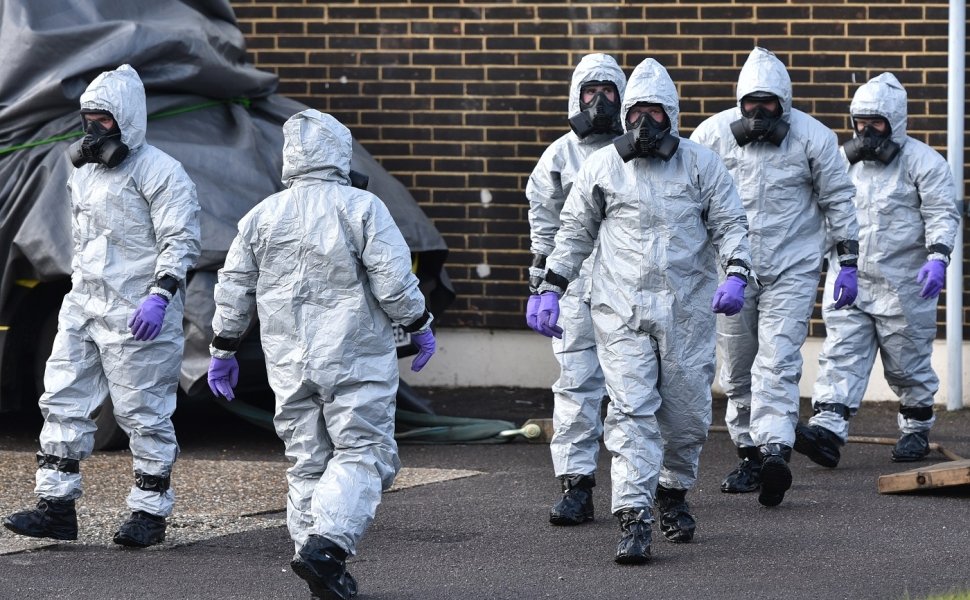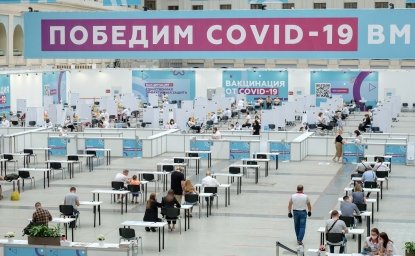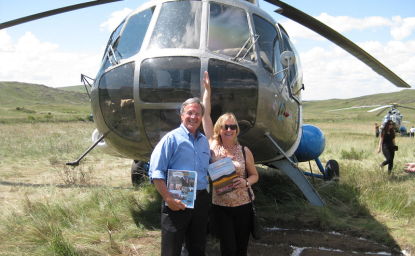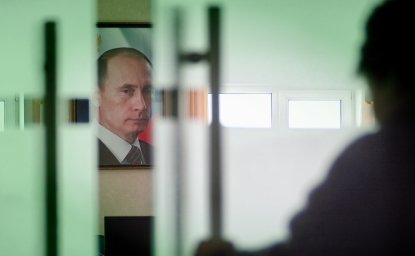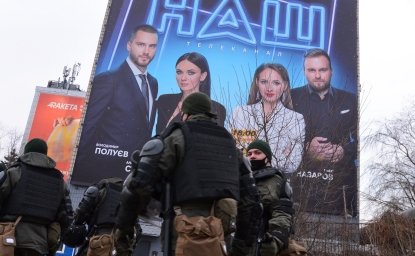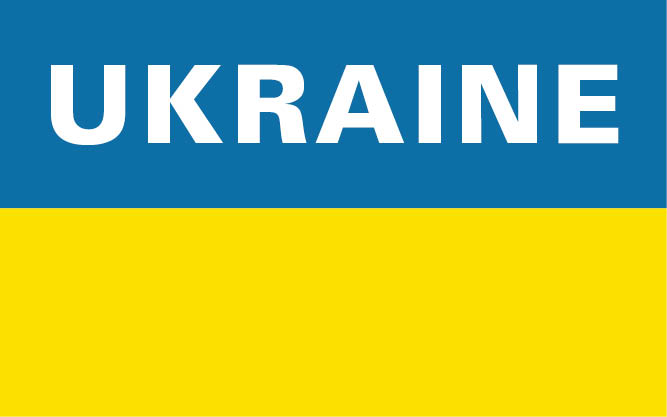Jill Dougherty: From the Kennan Institute in Washington, DC. Welcome to KennanX, a podcast on our never-ending quest to understand Russia, Ukraine and the surrounding region. I'm your host, Jill Dougherty.
Jill Dougherty: A shocking number of Kremlin opponents have died of poisoning. Back in the Cold War, there was Giorgi Markov, a Bulgarian dissident who died after a KGB agent stabbed him with an umbrella tipped in ricin in Ukraine. Presidential candidate Viktor Yushchenko was disfigured by poisoning. Journalist Anna Politkovskaya drank poisoned tea. Alexander Litvinenko, a former FSB officer who criticized the Kremlin, died after being exposed to Polonium 210, a radioactive isotope. Then there was Sergei Skripal, Vladimir Kara-Murza, and, of course, Alexei Navalny.
Recently, there have been reports that three Russian women who now live outside of Russia, two of them journalists, are likely to have been poisoned. Natalia Arno, head of an organization that supports civil society and democratic development in Russia, is one of them.
***
Natalia Arno: Well, this happened to me in early May. I was on my European trip to Berlin and Prague. And in Prague when I came back to my hotel room, I saw that the door was ajar. And of course, the first immediate reaction was that maybe a FSB or GRU officer, are waiting for me in my room. But I was laughing with myself at this thought. And of course, more natural reasoning was that probably I had forgot it. Though it was quite weird because I travel a lot, I am very often on planes and live in different hotels, and this is the first time I ever saw the hotel door open. When I got inside, I saw that there was nobody in the room. And for us pro-democracy Russians, surveillance is the norm.
Jill Dougherty: Natalia Arno, you're president of the Free Russia Foundation, founded in 2014. Can you describe what happened when you believe that you were poisoned?
***
Natalia Arno: We're very used, that we are being watched, that we are being recorded for the discreditation purposes or for any criminal cases against us, and so on and so forth. So, the first reaction was that probably my room was bugged and I started to check my room for any listening or recording devices. I checked my clothes, my suitcase, my room. I immediately noticed the very strong, unpleasant smell in the room. A very strange smell, like very strong, cheap, unpleasant, type of perfume. But I didn't find any devices and bugs in the room, and I changed and went out to have more meetings outside of the hotel. When I came back, the smell wasn't as significant and I worked a little bit more and I went to bed quite late. But 3 hours later, at 5 a.m., I woke up from a very sharp dental pain.
***
Natalia Arno: And again, foe the first reaction of a normal person is, yes, you have a toothache, you need to see a doctor. This is exactly what I felt. I asked my son, to make an appointment for the dentist. And I also understood that I won't be able to stay in Prague for another day, go back by train to Berlin, have more meetings in Berlin and so on. So, I immediately changed to my flight for the earliest available flight. It was 9 a.m. I came back to the United States, and this is when flying back to the US This is when I started to understand what was happening to me, to my body. Because if I had the slightest suspicion that it could be a poisoning, I of course, I wouldn't dare to have a transatlantic flight without medical attention for so many hours. But on the flight, I started to feel by wandering pain throughout my body. It wasn't a toothache any longer. I had like different density and intense events and timing of the pain all across the body and my armpits and my eyes and my chest and my ears and my stomach everywhere. So it was like the organs were failing one by one. And also simultaneously from the first second, I started to feel numbness in my especially arms, but also legs along my spine. When I started to feel it along my spine, it was quite scary.
So it was quite a nightmare of a flight. And I still have neuropathy. Recently, my doctor, a neurologist, confirmed that this is a polyneuropathy, couldn't be caused by natural reasons and also that it's almost impossible to treat it like there is no magic pill that just in a year, hopefully my nerves will regenerate. I just need to have more exercises and less stress. I told her it's easier to have more exercises. I cannot promise that I will have less stress and all with these conditions we are living in at the moment, with the ongoing war and repressions inside the country and so on. And yes, less stress is impossible.
But there is an ongoing investigation by U.S. authorities about my case. I don't have the results yet. But again, simultaneously, I learned about the other cases, as you mentioned, to journalists. They even had the test run by the Charité clinic where Alexei Navalny was treated when he was in coma and when he was, yes, all these consequences from the Novichok poisoning. And, of course, the case of Vladimir Kara-Murza, whose birthday is today, on September 7th, when we were recording this podcast. Yes. And he was poisoned, as you said, and it was in 2015 and 2017. And he has polyneuropathy. So, I can relate to his situation very well. I can understand how terrible he feels.
But back then when I learned about my case and about other cases, and when some journalists learned about it and made it public about how serious of alleged poisonings, I also spoke out about it. I posted a very long Facebook post addressing to the exiled anti-war, pro-democracy Russian community, saying that nothing new happened. We have always known that this regime is very brutal, very criminal, very murderous, very brazen, very vindictive. We have always known that transnational repression is quite a big thing for them. We have always known that poisoning is in their arsenal of attacking and silencing their opponents. And extrajudicial killings is not something new as well. There were murders or attempts to murder in so many European capitals. So yes, in London and Berlin and in Vienna. And so on. So nothing new. What it says, unfortunately, it's quite weird. Badge of honor not only Wednesday designates us as foreign agents or undesirable organizations, but also when they attack us, when they target us, when they try to poison us and silence us in this way, it means that we are very efficient, we are very impactful. We do something that irritates the Kremlin. And this is one of the things that is still left for them, how they can target us in the democratic world.
***
We as a community, we were so maybe less cautious when we fled Russia, when we became citizens or residents, or when we started to live in in different countries. Of course, there was a huge exodus of Russians under Putin’s, period of rule, but of course the biggest started in 2021 when basically the Kremlin eradicated the political opposition and civil society and independent journalism preparing for this full-scale invasion. But after the beginning of this full-scale invasion. Even bigger numbers of Russians had to flee Russia. So there is at least more than 1 million people all across the globe. Some of us are in, less safe countries like Central Asia or South Caucasus, like Armenia, Georgia, or so in Turkey and so on, we understand the risk because as I understand that there are a lot of FSB officers infiltrated and surveilling us in those countries or some of the countries like Kyrgyzstan, for example, can extradite pro-democracy Russians back to Russia. But those who were in the safe places like the European Union or in the United States or in Canada, we all thought that we are now safer and that we can continue our fight for a free and democratic and normal Russia without any hesitance, without any risks, without any threats. But unfortunately, the Kremlin tentacles are too long and for years and years, they we're doing a lot of malign activity in the West, including in the democratic world. And they have their agents networks, and they're very good at surveilling it, monitoring it again and doing a lot of this activity, and also talking to different decision makers, legislators, officials in many European countries, for example, they shouldn't be fearing them. We have always known who they are. As I said, yes, we have known that they are murderers and brutal and all that. But we also know what we do. We are committed to our fight. We should stand on our principles. We should continue doing everything we can to stop the war, to try to change public opinion inside Russia, to tell Russian people the truth, to tell the world the truth about Putin's regime, to expose their corrupt schemes, how they circumvent Western sanctions and so on and so forth. So we have a lot of work and we should be focused on our work without panic and without any fears, but more cautious, more careful, better prepared, more disciplined as a community.
Jill Dougherty: You know, in terms of just that particular way of attacking you and other let's call dissidents, people who oppose the Putin regime, why exactly do they take poisoning? Because I know some people have actually died and then others have not died but have been injured, like you and Vladimir Kara-Murza and others. What do you think? And this is almost a technical question, but why do you think they do resort to poisoning?
Natalia Arno: Very interesting question. I also think about it a lot, and about just why they do what they do all the time. If they think they can have the strongest support, why do they need to eliminate their opponents running for elections, like against elections? Like in 2015 why he needed to assassinate Boris Nemtsov, very close to the Kremlin? Why he needed to have all these criminal cases against Alexei Navalny? Those are the main opponents to him. If he is so sure in his popularity and how his regime works, why he needs to do that, why he needed to attack Ukraine like he did not only in 2022, but back in 2014?
But poisoning is also is a very barbaric method. Immediately when you hear about poisonings, the first association is about medieval times and about why, why is it Putin's regime is using all those methods? I think it worked for them. You mentioned a lot of cases which we know which are public, there are investigations about them. There are some confirmations about them. But also how many cases we don't know that were successful. And it seemed like a heart attack. Like I don't know what happened to your Yegor Gaidar or what happened to Anatoly Sobchak and so on, and many, many other cases. And about methods of assassination of opponents. It's also important because we know that Kadyrovites, for example, they prefer guns, they prefer to shoot people.
Jill Dougherty: Supporters of Kadyrov, the Chechen leader, just to be sure.
Natalia Arno: Yes, exactly. But when it's poisoning, it's more typical for GRU operations. Again, maybe because there were some laboratories and you can read and see what Andry Soldatov amd Irina Borogan were writing about it. And again, laboratories of how to eliminate your opponents. And they were mastering it for so many years. They tried different kind of poisons. We know that with Litvinenko was polonium. Then they used Novichok more likely against Vladimir Kara-Murza, definitely against Alexei Navalny and so on. And that is something new because in the recent insider investigation, they already are saying it's not Novichok any longer and it looks like it's something more for mass production, more like, again, like spray-ish. For example, I felt in my hotel room that there was some different strange smell in the room.
So, they tried different methods, different frequencies that what different kinds of poisons, see what works, what not. It's possible to put all people in Russia behind the bars just because, again, all the laws are so draconian that even, I don't know, even to think can be criminalized and punished. Repressions are more and more massive. More and more people are in jail. We have the biggest number of political prisoners, bigger even than in the late Soviet times. But still, it's not like everybody. And this is what they do with poisons. It's enough for them to poison, let alone to two, three, ten people just again, to scare the entire community. But I think this is where they under-estimate us the same way as the Kremlin underestimated Ukrainians and Ukrainian people and their bravery and their commitment, their dedication to save and protect their land and be independent.
They underestimated Russian pro-democracy forces as well when they waited a decade and then the records and for so many years they thought nothing will grow there any longer. But no grassroots are emerging all the time inside Russia and outside that I a lot of protests every day, again inside and outside. And we're more and more activity. So again, we see the clear path, we pro-democracy Russians are not only are the first victims of Putin's regime, of course, not the biggest, Ukrainians are, but we were the first targeted by the Kremlin's regime. The first targets to be silenced and murdered and jailed and forced out of the country. And we are the first to tell the world about the danger of this regime, and that the internal repression will not stay in its borders. It will be external aggression, inevitably.
But also we are the agents of change. We are the only force that is believing that Russia should be and must be democratic. And all democracy in Russia is a guarantee of sustainability of Ukraine's victory and the key factor of security and stability in the region and globally. Only we can bring those changes. And I think it's important for the Western community to understand this, to treat us as their asset. It's not only that we are a problem or a headache for Europe, for example, it's not only that we are asking for visas or bank accounts.
No, we are expertise. We are those who know the Kremlin's regime better than anybody. We can help Western governments, democratic governments to be better prepared, to formulate a better and very smart strategy how to counter this regime. We know so much, we experience so much. It's very often Russian people, Russian journalist or activists who expose the crimes of the Kremlin.
It was a Russian journalist who was the first to discover Prigozhin’s factories of trolls, for example, and then the Western media picked it up. Or it was a Pskov politician, and a Pskov newspaper who wrote for us about the direct military invasion of Eastern Ukraine back in 2014. And so on and so forth. So, we are the ones who know how this regime works, how it thinks. We know how Russian people think and how they behave. And we are the ones who can influence that. And that's very important for the West to work with us together. We are the best allies. It's what we always ask. Don't judge us on the basis of our ethnicity or of our citizenship. Judge us on the basis of our values and of our actions. It's very important.
Jilly Dougherty: But talking about, let's say, inside Russia right now, obviously your purpose is democratization and making Russia a democratic country. But right now there really is a feeling, right or wrong in the West that a lot of Russians support the regime and very few people are talking about any democratic movement right now in Russia. And yet you're saying there are signs so give me some signs. What is happening inside of Russia that really gives you hope that it could eventually be a normal democratic country?
Natalia Arno: Thank you. It's a good question. Usually when I read the newspapers, especially when I talk to some sociologist or some politicians, it's very often that it could be demoralizing and that could be like no hope. But since my organization and many of our partners, we work with Russian people, we work both inside Russia and outside with the exiled Russian community.
We see how much is happening, how active they are, how committed all of them are, especially young people. It was a very big surprise to see that despite all this level of propaganda and all this educational reforms and of course, all this repressive legislation, that still a lot of people understand what's going on. Russia is the second country in the world now in installing VPNs. When everything is blocked and censored and forced the way Russian people still look for information, they still try to find objective and truthful information.
And a lot of those who don't know what VPNs are, what social media is, there is a very popular initiative right now which is called printout Internet. All these activists print out facts and they put it out as newspapers as just printouts into mails of those who don't know about how to find information. So it means that almost every day there was somebody detained for a protest activity and many Russians protest, some of them protest in the radical way, like sit in conscription centers and fire drill and trains, cutting television cables to stop this huge propaganda, unprecedented propaganda, or some just do sabotage or promote the idea of sabotage and not helping the regime or do something which is maybe less public, more grassroots, more on the ground, but still civil society work. Some initiatives, for example, persuade Russians not to donate for anything war related, even if it's just, I don't know, backpacks or uniforms for soldiers saying that this will prolong the war. Let's better donate to, I don't know, to dogs, cats, to orphans and things like that.
So they're very active in even despite, again, as I said, eradicating everybody, forcing a lot of us in exile or in a lot of us in jail. Russia is not only an 11 times own country and are not only like 80 plus region country, it's also a country of over 190 ethnic minorities. And for years and years, Putin's regime’s strategy was to impoverish regions again to get all the money from the regions, to distribute the funding and the like.
Again, the regions are just very, very poor people. More and more people are under poverty line and many of them are national republics, and this is basically a tax on poverty. Those are being conscripted to the war who are from all these poor regions, poor national republics. And as a response, so many ethnic minority antiwar groups appeared. We had never had such a vibrant landscape of ethnic minority groups before, trying to talk to their people, trying to tell them how to terminate contracts, how not to go to the war, how to avoid mobilization, or how to get evacuated from Russia if needed.
And they're very popular. And that's why the Kremlin, again, as a response, they attack them, censor blogs, their websites, cut the new channels of communication. Even if they're in exile, it's very difficult for them to talk with their communities inside or put them on the foreign agents list. And even Free Buryatia Foundation that was the first ethnic minority anti-war group.
Jill Dougherty: Maybe you could explain just really quickly. Buryatia, it is a region of Russia. I believe is it's Buddhist.
Natalia Arno: Yes, it's Buddhist. It's one of three Buddhist republics, and it's on the eastern side of Lake Baikal. It's close to Mongolia. And under Stalin times, it was divided into five different regions. Now it's three regions of the Russian Federation where everywhere Buryats are in minority, even within the Republic of Buryatia itself.
There are less than 30% of Buryats. Again, not to make them a strong movement to ask for independence and so on. And is since the very first days of the full scale invasion. They are on the top of casualties. Always like top 3 to 5. So, a lot of people had been conscripted. A lot of people are dying in this brutal colonial war.
And that's why as a response, again, Free Buryatia Foundation was the very first ethnic minority antiwar organization and the very first to be on the foreign agents list and the very first to be on the undesirable list. And yes, it gives us hope because we see people, we see their commitment, we see how much they are doing.
But also even if the entire world is skeptical about prospects of Russia, we pro-democracy Russians, we cannot afford to be skeptical. We should have this vision of a free and democratic and normal Russia, and we should fight for it every day.
***
Jill Dougherty: Hmm. Well, Natalia, I know this is both, I would say inspiring and frightening because of what's happened to you, but the work that you're doing really is inspiring. And I wish you a lot of luck with that. And I also wish you a lot of luck with your health that you will get better. And you're obviously back in the fight because you're at work all the time. But thank you very much for talking with us and we will stay in touch and would very much like to follow up if there are any developments, both about your health and then about the democracy movement within Russia?
Natalia Arno: Thank you, Jill. It was an honor to be here.
Jill Dougherty: Kennan X is a product of the Kennan Institute at the Woodrow Wilson International Center for Scholars in Washington, DC. It’s the Wilson Center's oldest program, founded in 1974 by George F. Kennan, American statesman, James Billington, historian and former librarian of Congress, and historian S. Frederick Starr. Inspired by them, The Kennan Institute's mission is to improve America's understanding of Russia and the wider region.
Thanks for listening.
